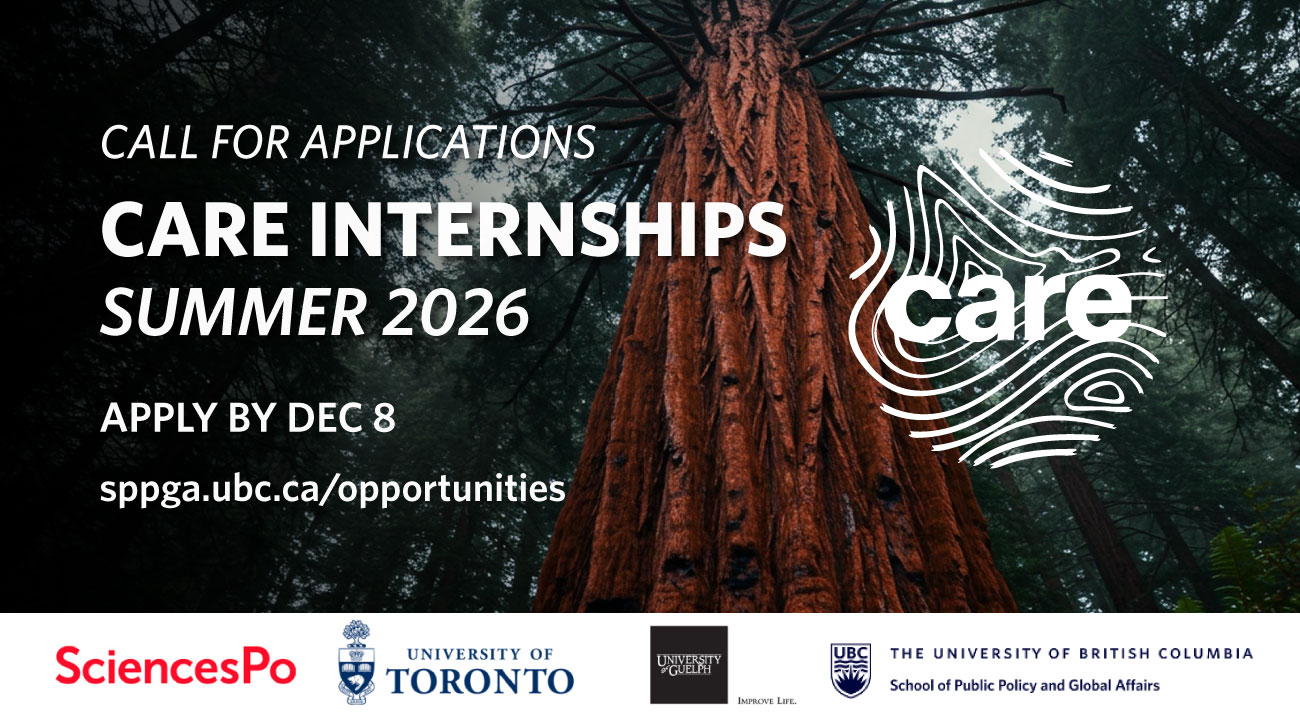UBC Master of Public Policy and Global Affairs (MPPGA) students recently competed in the 2021 National Public Administration Case Competition held on February 20, 2021. In this year’s competition, teams worked on the case study, A National Disgrace: Long-Term Care and COVID-19. Learn more about our MPPGA students’ experiences in their reflection below:


L-R: MPPGA students Anoushka Chandarana, Lindsey Wall, Arthur Zhang, and Surabhi Gupta
The National Annual Public Administration Case Competition, hosted by the Institute of Public Administration of Canada and Canadian Association of Programs in Public Administration – more commonly referred to as the CAPPA Competition – invites teams of students from across the country to prepare and present a policy briefing, based on a real-world issue, to a panel of judges.
The competition gives future policymakers an opportunity to practice key skills, such as multifaceted research, policy analysis, feasibility assessments, data visualization, public speaking, and teamwork under strict time constraints. It also provides a great introduction to the Canadian policymaking network, as the judging panel consists of high-level public service officials with expertise in different sectors, and over a dozen of Canada’s policy schools participate in the competition.
Our team, Anoushka Chandarana, Arthur Zhang, Lindsey Wall and Surabhi Gupta, had the privilege of being selected by SPPGA to represent UBC at the national competition. We were thrilled to have the opportunity to participate in all elements of the competition, from preparation to presentation, and are now very excited to share our experience with others.
Preparations
Our preparations began just before the winter break. Armed with a semester’s worth of knowledge in policy theory and practice and under the guidance of our wonderful coach, Dr. Kristen Hopewell, we began to dive into practice cases. We explored a variety of topics, ranging from digital security to affordable housing and the refugee crisis to pipeline politics to gain a strong command of Canadian policy tools, understand the nuances of interprovincial dynamics, and practice our rapid decision making skills.
As we conducted research and built policy alternatives, we benefited immensely from the different backgrounds that our team members represented. From choosing best practices to mitigating unintended consequences of policies, our discussions were enriched by the diversity of voices, and allowed us to develop robust ideas after meaningful consultation. It was certainly a steep learning curve, but the bulk of our skill and team development came from these six weeks of pre-competition practice. It was a fantastic opportunity to put lessons from our coursework into action, and the skills we built during this preparation phase will be immeasurably useful in our MPPGA degree moving forward, and in our careers as policy professionals.
Reflections on the Virtual Environment
Navigating the global pandemic presented unique dynamics to our preparation process this year. In fact, some of our team members have never met in person! Over the course of the six-week preparation process, two of our teammates arrived in Canada, while another continued to live on the other side of Canada. As a team, we got to share our experiences – from jet lag to signing in from different time zones, all while coordinating weekly practice runs to prepare for the competition. Nonetheless, there were some hidden blessings to ‘online policymaking’. It allowed us to join a group meeting at a moment’s notice and share information instantaneously. This virtual exchange facilitated the rapid and agile decision making and problem solving that is highly necessary in the policy world.
The Case
After several weeks of training, the day had finally arrived: It was time to find out what case we would be working on for the 2021 CAPPA Competition. With keen anticipation, we repeatedly refreshed our email inboxes, waiting to see what the topic would be. We were excited – although not surprised – when we saw that this year’s topic was centred around COVID-19. After all, how could it not be?
The case prompted us to look at Long Term Care in Canada – an area of health delivery where Canada has struggled greatly throughout the COVID-19 pandemic – and consider options for a national strategy for Canadian Long Term Care. A particularly engaging element of this topic was that since it was so timely, details about the topic were unfolding throughout the week, as we prepared our case. This kept us on our toes, as we had to continuously scan current events sources to ensure we were incorporating the most up-to-date information in our presentation. It was also inspiring to know that as we were preparing draft strategies for this simulated policy problem, real-world policy makers were grappling with the exact same issues.
Teams were given one week to develop their analysis, policy options and recommendations; build their briefing presentation; and practice their arguments. In order to prepare, we met throughout the week virtually to research, discuss and rehearse our policy case. Drawing on what we learnt throughout our time together as a team, we immediately went to work on the case study.
Competition Day
Although we didn’t get the opportunity to travel in person to the competition, which was supposed to be hosted in Saskatchewan this year, that neither discouraged our enthusiasm in working together, nor did it diminish the level of professionalism that was brought by the organizers of the event. Every meeting, including the opening ceremony, tech rehearsal, group presentation, and announcement of awards, was seamlessly executed. The week absolutely flew by, and before we knew it, competition day was upon us.
After a very early wake up (5:00 am for those of us on the West Coast), each of us set up our virtual broadcasting stations, brushed the dust off of our business attire, and prepared for the big day. We jumped onto one last Zoom call for a quick dress rehearsal, and by 7:30 am we were in the virtual backstage area, full of nerves and excitement, ready to present.
The experience of presenting was fast and exhilarating. Teams were given 30 minutes to present and respond to the judging panel’s questions, and the competition organizers were very clear: The clock stops for no one. The feeling of seeing the judges’ virtual hands fly up as we concluded our presentation, and of having high-level professionals meaningfully engage with material that we had assembled was an unforgettable one.
Results and Lessons Learned
We certainly believed the competition achieved its goals of introducing us to the world of policy analysis, both as we prepared for the case, as well as the presentation itself. Running through the several practice cases introduced the fast-paced nature of the policy world to our team, as we tackled a different issue every week. We built on each iterative practice run to further improve and draw upon the transferable skills that are necessary for effective policy analysis. As we began to come up with strategies beforehand in how to approach a case, we also bonded closer as a team.
The competition itself also gave us the opportunity to present to a wide panel of judges. After we finished, we received positive feedback from the competition judges for a strong analysis of the problem and for the complexity and professionalism of our presentation. The strategy we recommended – the introduction of a national Long Term Care Insurance program – was ambitious and transformative. And while our go big or go home approach didn’t lead to a top-three finish for our team, it did allow us to deeply explore the Canadian long term care landscape as well as the nitty-gritty details of federal policy making.
New Perspectives
Although our reflections might sound different from what participants in previous years have said about their CAPPA experience – due to our participating in the competition amidst a global pandemic – we were nevertheless able to develop our skills as aspiring policy practitioners. We still practiced and presented as a team, and sharpened our policy analysis skills along the way. So while we experienced a new perspective on presenting in the COVID-19 era, some of the principle lessons remained the same. If anything, the experience of this year’s 2021 CAPPA Case Competition has taught us that virtual policy analysis is certainly possible. Sure, it might have taken a bit of time to get used to all the different features on Zoom, but in the end, our team still came out with unforgettable moments working on our policy case together.
Ultimately, we would sincerely like to express our gratitude to our mentor, Dr. Kristen Hopewell, for always giving valuable advice and continuous encouragement, the staff and faculty at SPPGA, who provided us with the opportunity to participate in this year’s competition, and finally, to the CAPPA organizers for making this an absolutely professional and memorable experience. Showcasing our final product, a presentation that we had laboured over for a full week, was absolutely worth it!
We look forward to next year’s team working on another new challenge, and are always available to share our insights and help out in any way we can.
– Anoushka Chandarana, Arthur Zhang, Lindsey Wall and Surabhi Gupta


